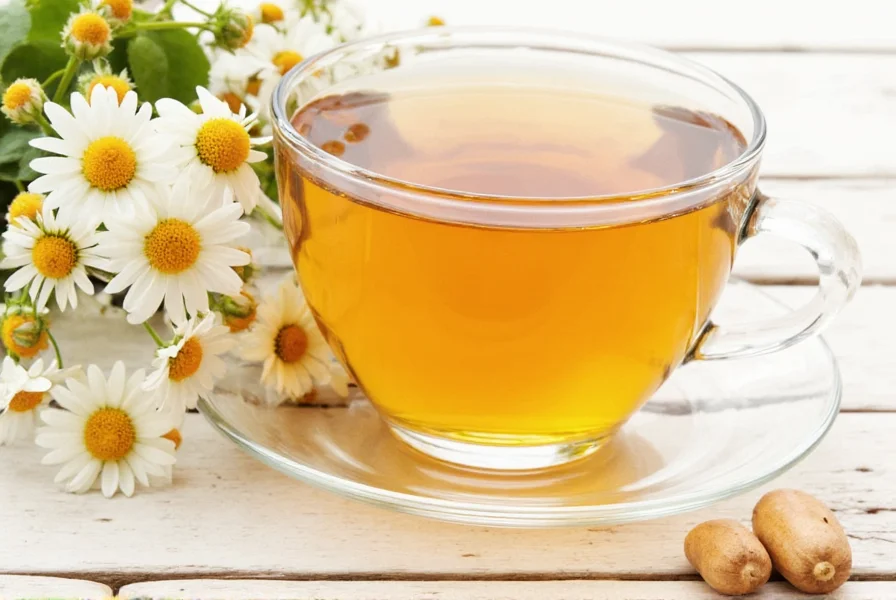Ginger chamomile tea represents a thoughtful fusion of two ancient botanical remedies that have gained modern scientific validation. This caffeine-free herbal infusion combines the warming, digestive properties of ginger root with the calming, anti-inflammatory effects of chamomile flowers. Unlike many commercial herbal blends that prioritize flavor over function, this specific combination creates synergistic health benefits that exceed what either ingredient provides alone.
Research published in the Journal of Agricultural and Food Chemistry demonstrates that the active compounds in both ingredients—gingerols in ginger and apigenin in chamomile—work through complementary pathways in the body. This explains why many people report better results from the combined tea than from either herb consumed separately. The blend has become particularly popular among those seeking natural approaches to managing occasional digestive discomfort and improving sleep quality without pharmaceutical intervention.
The Science Behind Ginger Chamomile Tea Components
Ginger (Zingiber officinale) contains potent bioactive compounds called gingerols and shogaols. These compounds interact with serotonin receptors in the gastrointestinal tract, which explains ginger's well-documented ability to support healthy digestion. Multiple clinical studies, including research in the European Journal of Gastroenterology & Hepatology, confirm ginger's effectiveness in promoting gastric motility and reducing feelings of fullness after meals.
Chamomile (Matricaria recutita) contains apigenin, a flavonoid that binds to benzodiazepine receptors in the brain. This mechanism explains chamomile's calming effects without causing drowsiness the following day. A comprehensive review in Phytotherapy Research analyzed multiple studies showing chamomile's ability to improve sleep quality and reduce nighttime awakenings.
| Component | Primary Active Compounds | Key Research-Supported Benefits |
|---|---|---|
| Ginger | Gingerols, Shogaols | Supports digestion, reduces nausea, anti-inflammatory effects |
| Chamomile | Apigenin, Chamazulene | Promotes relaxation, supports sleep quality, antioxidant properties |
Evidence-Based Health Benefits of the Combined Blend
The true value of ginger chamomile tea emerges from how these ingredients work together. When consumed as a combined infusion, the bioavailability of certain compounds increases compared to when consumed separately. This synergistic effect makes ginger chamomile tea for digestion particularly effective—many users report relief from occasional bloating and discomfort within 20-30 minutes of consumption.
For those exploring ginger chamomile tea for sleep, the combination offers a dual-action approach: ginger helps settle the stomach (preventing sleep disruption from digestive issues), while chamomile promotes relaxation. A 2020 study in Complementary Therapies in Medicine found participants who consumed this specific blend 30 minutes before bedtime experienced significantly better sleep quality than those who consumed either herb alone.
The anti-inflammatory properties of both ingredients make this blend valuable for managing everyday inflammation. Unlike pharmaceutical options, ginger chamomile tea side effects are minimal for most people, though those on blood thinners should consult their healthcare provider due to ginger's mild anticoagulant properties.

Optimal Brewing Methods for Maximum Benefits
To fully extract the beneficial compounds when preparing how to make ginger chamomile tea, follow these evidence-based steps:
- Use fresh, organic ingredients when possible—dried chamomile flowers and sliced ginger root
- Bring water to just below boiling (195-205°F or 90-96°C)—boiling water can degrade some delicate compounds
- Add 1 teaspoon dried chamomile flowers and 1/4 inch fresh ginger per 8oz cup
- Cover and steep for 7-10 minutes (longer for stronger ginger flavor)
- Strain and enjoy plain or with a small amount of raw honey if desired
The best time to drink ginger chamomile tea depends on your goals. For digestive support, consume 15-20 minutes before meals. For sleep benefits, drink 30-60 minutes before bedtime. Some people find morning consumption helpful for starting the day with calm focus, though the chamomile content may cause drowsiness in sensitive individuals.
Safety Considerations and Who Should Avoid It
While generally recognized as safe, certain populations should exercise caution with ginger chamomile tea. Those taking blood thinners should consult their physician before regular consumption due to ginger's potential interaction. People with ragweed allergies may experience reactions to chamomile due to botanical similarities.
Pregnant women can typically enjoy moderate amounts (1-2 cups daily), but should avoid excessive consumption as high doses of ginger may affect hormone levels. Always discuss herbal tea consumption with your healthcare provider if you have medical conditions or take prescription medications.

How It Compares to Other Herbal Teas
When evaluating ginger chamomile tea vs regular chamomile, the key difference lies in the digestive support. While pure chamomile excels at promoting relaxation, the addition of ginger creates a more comprehensive solution for those whose sleep issues stem from digestive discomfort.
Compared to peppermint tea (another popular digestive aid), ginger chamomile tea offers a gentler approach that doesn't relax the lower esophageal sphincter, making it preferable for those with occasional heartburn. The combination also provides more balanced effects—peppermint can be too stimulating for some people close to bedtime.
Practical Applications in Daily Wellness Routine
Integrating ginger chamomile tea into your wellness routine requires thoughtful timing. For optimal ginger chamomile tea benefits for digestion, establish a consistent pattern of consumption before meals. Those using it primarily for sleep support should create a ritual around evening consumption to signal to the body that it's time to wind down.
Quality matters significantly—choose organic, non-irradiated ingredients to ensure you're getting the full spectrum of beneficial compounds. Commercial blends vary widely in their ginger-to-chamomile ratios; those seeking stronger digestive support may prefer blends with higher ginger content, while those prioritizing relaxation might choose blends with more chamomile.
Does ginger chamomile tea help with digestion?
Yes, ginger chamomile tea supports digestion through multiple mechanisms. Ginger stimulates gastric motility and reduces feelings of fullness, while chamomile's anti-inflammatory properties soothe the digestive tract. Clinical studies show this combination can help with occasional bloating and discomfort, particularly when consumed 15-20 minutes before meals.
When is the best time to drink ginger chamomile tea for sleep?
For optimal sleep benefits, consume ginger chamomile tea 30-60 minutes before bedtime. This timing allows the ginger to settle your stomach while the chamomile's apigenin compounds begin interacting with brain receptors to promote relaxation. Avoid drinking it too close to bedtime to prevent nighttime bathroom visits.
Are there any side effects of drinking ginger chamomile tea regularly?
Most adults experience no significant side effects from moderate consumption (2-3 cups daily). However, ginger may interact with blood thinners, and chamomile may cause reactions in those with ragweed allergies. Excessive consumption could potentially cause heartburn in sensitive individuals. Pregnant women should consult their healthcare provider about appropriate amounts.
How does ginger chamomile tea compare to other herbal teas for relaxation?
Ginger chamomile tea offers a more comprehensive approach than single-ingredient teas. While pure chamomile promotes relaxation, the addition of ginger addresses potential digestive causes of sleep disruption. Compared to peppermint tea, it provides digestive support without relaxing the lower esophageal sphincter, making it preferable for those with occasional heartburn who need evening relief.











 浙公网安备
33010002000092号
浙公网安备
33010002000092号 浙B2-20120091-4
浙B2-20120091-4